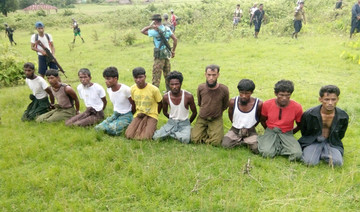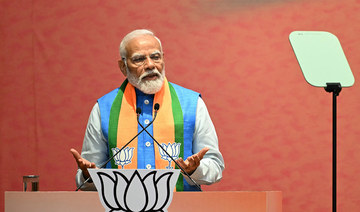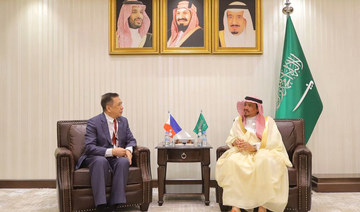GENEVA: Myanmar’s army has used unfathomable levels of violence against minority Rohingya, UN investigators said on Tuesday, calling for the military to be removed from politics and top generals to be prosecuted for genocide.
In the most meticulous breakdown of the violence in Myanmar to date, a UN team of investigators presented a 444-page report laying out in horrifying detail a vast array of violations committed by the country's powerful military, especially against the Rohingya Muslims.
“It is hard to fathom the level of brutality of Tatmadaw operations, its total disregard for civilian life,” head of the UN fact-finding mission Marzuki Darusman told the UN Human Rights Council, referring to the nation’s military.
Myanmar's ambassador to the UN, Kyaw Moe Tun, slammed Tuesday's report as “one-sided” and “flawed.”
A brutal military crackdown last year forced more than 700,000 Rohingya to flee over the border into Bangladesh amid accounts of arson, murder and rape at the hands of soldiers and vigilante mobs in the mainly Buddhist country.
Myanmar’s army has denied nearly all wrongdoing, insisting its campaign was justified to root out Rohingya insurgents who staged deadly raids on border posts in August 2017.
Full statement of #FFMMyanmar delivered today at #HumanRights Council #HRC39 #Myanmar https://t.co/1TsmhOk3M7 pic.twitter.com/UNntC6OPIU
— HRC SECRETARIAT (@UN_HRC) September 18, 2018
The UN team said the military’s tactics had been “consistently and grossly disproportionate to actual security threats,” and said that estimates that some 10,000 people were killed in the crackdown was likely a conservative figure.
It said there were reasonable grounds to believe that the atrocities were committed with the intention of destroying the stateless Rohingya, warranting the charges of “genocide.”
Saudi Arabia’s ambassador to the UN, Ambassador Dr. Abdulaziz Al-Wasil, told the Human Rights Council that the Kingdom expressed regret over the “appalling violations of international humanitarian law by the armed forces against the innocent Rohingya.”
The suffering of the Rohingya people is one of the issues of greatest concern to Saudi Arabia, Al-Wasil said.
A shorter version of the mission’s report, published last month, had already called for Myanmar’s army chief and five other top military commanders to be prosecuted in an international court for genocide.
In his presentation, Darusman provided excruciating details of massacres in Rohingya villages, pointing out that “the men were systematically killed. Children were shot, thrown into the river or onto a fire.”
Women and girls meanwhile were routinely gang-raped before being locked inside burning houses.
Of those who survived, many had been severely bitten, in what appeared to be “akin to a form of branding,” he said.
Darusman said the “scale, cruelty and systematic nature (of the sexual violence) reveal beyond doubt that rape is used as a tactic of war.”
The UN analysis decried the army’s hold on political life in Myanmar, which only recently emerged from almost a half century of total military junta rule.
The military holds a quarter of seats in parliament and controls three ministries, making its grip on power firm despite reforms beginning in 2011.
Aung San Suu Kyi’s democratically-elected government remains in a delicate power balance with the generals, whose presence in parliament gives them an effective veto on constitutional changes.
“There cannot be any democratic transition in Myanmar unless the Tatmadaw relinquishes its control of the politics, of the economy and of the constitution,” UN investigator Christopher Sidoti said.
“We have seen not the birth of democracy in Myanmar, regrettably, but the stillbirth.”
The UN mission said Myanmar's civilian government had also helped enable the widespread rights violations in Myanmar by allowing hate speech against the Rohingya to flourish and using civilian laws to crack down on media and others speaking out against abuses.
The investigators directed specific criticism at Suu Kyi, whose global reputation has been shattered by her failure to speak up for the Rohingya against the military.
While acknowledging that the civilian authorities have little influence over military actions, the report said that their “acts and omissions” had “contributed to the commission of atrocity crimes.”
Pointing to “deeply entrenched” impunity in Myanmar, the investigators said the only chance to obtain accountability was through the international justice system.
They also repeated suggestions that crimes against the Rohingya be referred to the International Criminal Court, which concluded in August that it had jurisdiction to investigate even though Myanmar is not a member of the treaty underpinning the tribunal.
Myanmar has dismissed the tribunal’s authority and analysts have pointed to the court's lack of enforcement powers.
The UN investigators also recommended an arms embargo and "targeted individual sanctions against those who appear to be most responsible".
They called for “a comprehensive, independent inquiry” into the UN's own role in Myanmar since 2011, warning that “quiet diplomacy” appeared to have sidelined those pushing to loudly denounce rights violations.






























